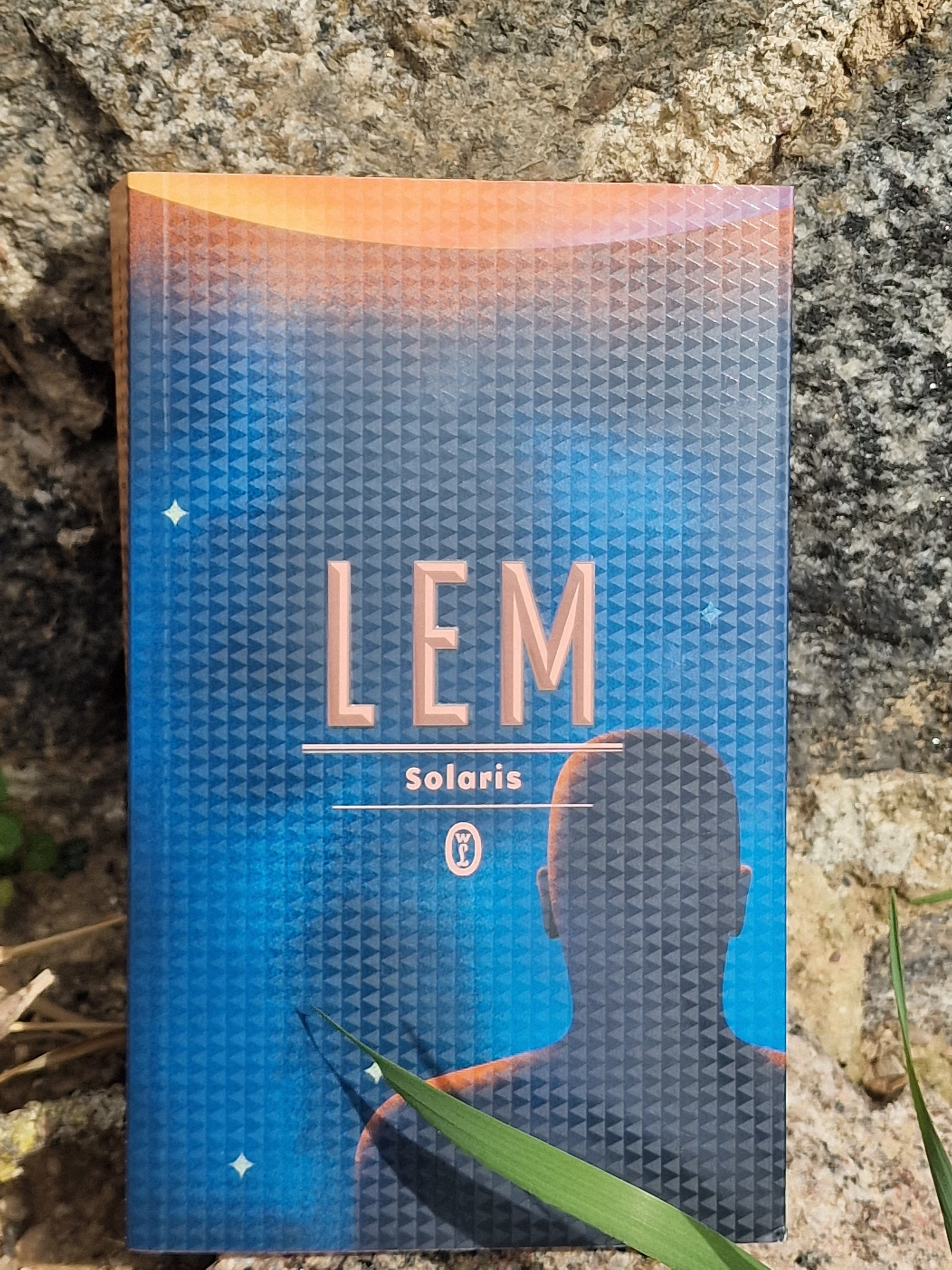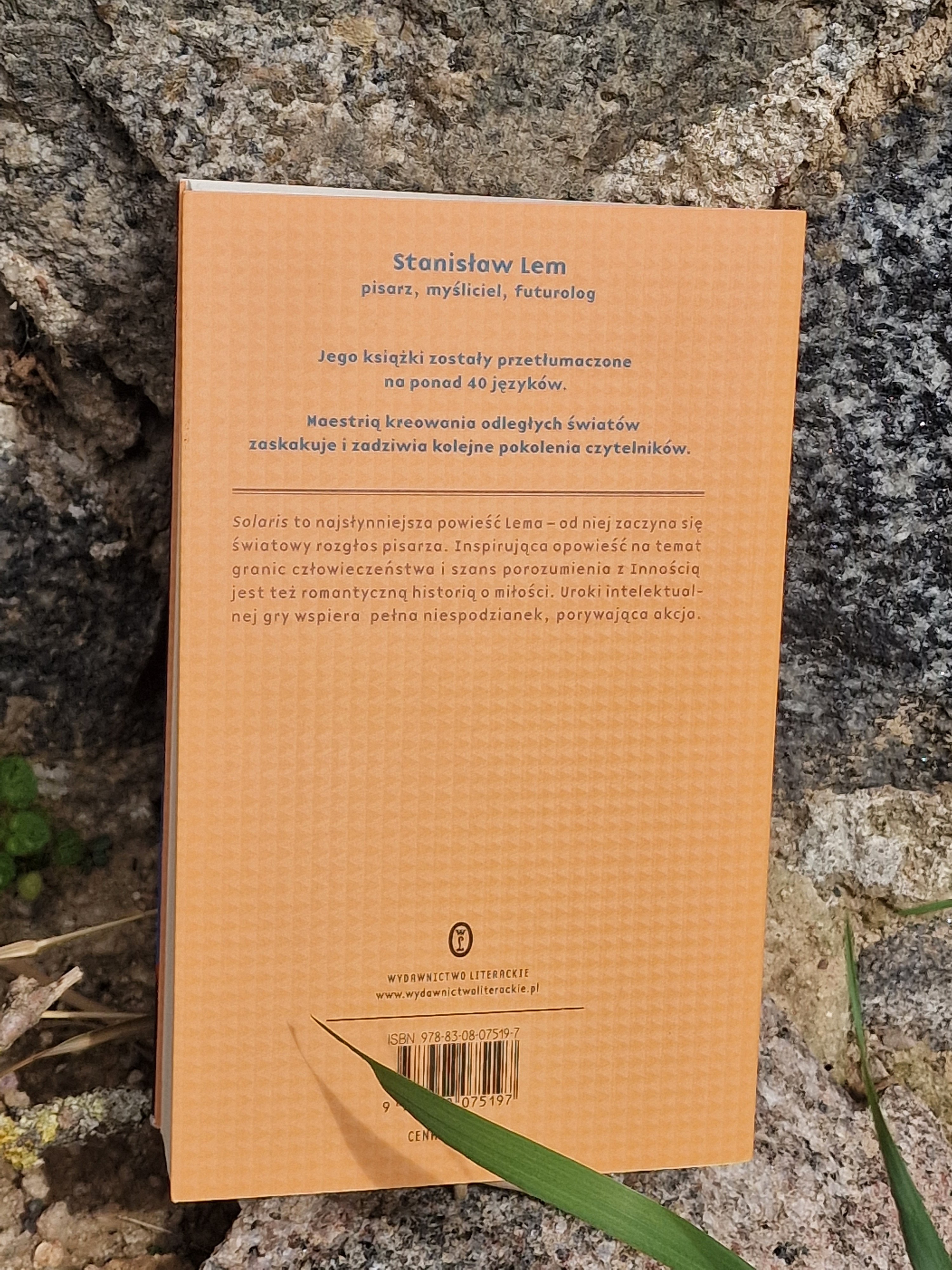Stanisław Lem "Solaris" - Something about us
There are books that you promise yourself you will ‘read someday,’ and then several years pass and they are still sitting on the shelf. That was the case with Solaris for me. I had known Lem's name for a long time, but there was always something lighter to read in the evening. Finally, I decided: no more excuses, I'm going for it. And I hit the nail on the head. This is not a novel that you ‘devour’ in three hours and put down without a trace. I mainly read outside — by the lake, in the park, on a bench under a maple tree in my neighbourhood. In such circumstances, this book becomes even denser. You sit there, tea steaming from your thermos, someone next to you throws a stick to their dog, and you have an ocean in front of your eyes that may be thinking. You listen to the rustling of leaves and suddenly feel that this whole cosmos is not about stars at all. It's about memory, about how stubborn it can be. There were moments when I had to close the book and look at the water, because what Lem does with guilt and longing gets under your skin. There are no technological fireworks here, no explanations of everything to the end. Instead, there is silence, tension and the kind of anxiety that reminds you of your own issues that are better left untouched, but which he touches upon nonetheless. And yes, sometimes I went back a few paragraphs to check if I had understood the meaning correctly, because the language can be dense; this is not a disadvantage, but an invitation to slow down.
Są książki, które człowiek obiecuje sobie „kiedyś przeczytać”, a potem mija kilka lat i dalej stoją na półce. U mnie tak było z „Solaris”. Nazwisko Lema znałam od dawna, ale zawsze znalazło się coś lżejszego do wzięcia na wieczór. W końcu stwierdziłam: koniec wymówek, biorę. I trafiłam w punkt. To nie jest taka powieść, którą się „połyka” w trzy godziny i odkłada bez śladu. Ja czytam głównie na zewnątrz — nad jeziorem, w parku, na ławce pod osiedlowym klonem. Ta książka w takich okolicznościach robi się jeszcze gęstsza. Siedzisz, z termosu paruje herbata, ktoś obok rzuca psu patyk, a ty masz przed oczami ocean, który może myśli. Słuchasz szurania liści i nagle czujesz, że w tym całym kosmosie wcale nie chodzi o gwiazdy. Chodzi o pamięć, o to jak bardzo potrafi być uparta. Miałam momenty, że musiałam zamknąć tom i popatrzeć na wodę, bo to co Lem robi z poczuciem winy i tęsknotą, wchodzi pod skórę. Nie ma tu fajerwerków technologii ani tłumaczenia wszystkiego do końca. Zamiast tego — cisza, napięcie i ten rodzaj niepokoju, który przypomina o własnych sprawach, których lepiej nie dotykać, a on jednak dotyka. I tak, czasem wracałam o kilka akapitów, żeby sprawdzić czy dobrze złapałam sens, bo język bywa gęsty; to nie jest minus, tylko zaproszenie, żeby zwolnić.

I won't summarise the plot, because it would be a shame to spoil the discovery, but I will say this: a research station, a planet, an ocean from another logic, and yet the most important things happen inside people. Lem reverses the perspective: ‘contact’ with the alien is not an end in itself here, but a mirror in which humans are reflected. And this mirror is not polite. It can bring out old images so vividly that the characters have to face them as if they were alive. I have thought a few times about what would happen if such a ‘reflection’ stood in front of me. Would I run away? Pretend I didn't see it? Or maybe I would try to talk to it, even though you know you are talking more to your own conscience than to anyone else. What I like about Solaris is that it doesn't sell easy morals. Scientists are less important here than their helplessness, procedures less than trembling hands. And then there's the atmosphere — suspended, a little cold, one in which every step is louder than usual. Reading outside, I had my own little ‘special effects’: the wind turned the pages, a mosquito buzzed in my ear (it almost hit the best scene), and ‘pass!’ came from the football field. It all strangely harmonised with the text. The real world filled in the pauses. This contrast — an ordinary day and cosmic loneliness — made the book sink in deeper than if I had been sitting at my desk. And when I came across a more difficult passage, I wasn't ashamed to go back. Sometimes you try to go through the letters too quickly and lose the meaning, so it's worth taking a breath here. Seriously, this novel teaches a different pace: read, think, stop, go back. At one point, I caught myself thinking less ‘I want to know what happens next’ and more ‘I want to hear better what has already been said’.
Fabularnie nic nie będę streszczać, bo szkoda psuć odkrywanie, powiem tylko tyle: stacja badawcza, planeta, ocean jak z innej logiki, a jednak to, co najważniejsze dzieje się w środku ludzi. Lem odwraca perspektywę: „kontakt” z obcym nie jest tu celem samym w sobie, tylko lustrem, w którym odbija się człowiek. I to lustro nie jest grzeczne. Potrafi wyciągnąć dawne obrazy, tak plastycznie, że bohaterowie muszą stanąć przed nimi jak przed kimś żywym. Pomyślałam parę razy co by było, gdyby takie „odbicie” stanęło naprzeciw mnie. Uciekłabym? Udawała, że nie widzę? A może próbowała rozmawiać, choć wiesz, że rozmawiasz bardziej z własnym sumieniem niż z kimkolwiek innym. Lubię w „Solaris” to, że nie sprzedaje łatwych morałów. Naukowcy są tu mniej ważni niż ich bezradność, procedury mniej niż drżenie rąk. I jest jeszcze atmosfera — zawieszona, trochę chłodna, taka, w której każdy krok słychać głośniej niż zwykle. Czytając na dworze, miałam swoje małe „efekty specjalne”: wiatr przewracał strony, komar brzęczał przy uchu (prawie trafił w moment najlepszej sceny), a z boiska dobiegało „podaj!”. To wszystko dziwnie współgrało z tekstem. Realny świat dopowiadał pauzy. Ten kontrast — zwykły dzień i kosmiczna samotność — sprawił, że książka weszła mi głębiej niż gdybym siedziała przy biurku. A kiedy trafiał się trudniejszy fragment, nie wstydziłam się cofnąć. Czasem człowiek próbuje iść przez literki za szybko i gubi sens, tu warto wziąć oddech. Serio, ta powieść uczy innego tempa: czytaj, myśl, zatrzymaj się, wróć. W pewnym momencie złapałam się na tym, że mniej „chcę wiedzieć co dalej”, a bardziej „chcę lepiej usłyszeć to, co już zostało powiedziane”.

Finally, the impression that remained strongest: pride and gratitude. Pride that such an author is from here, from the country where I go every day to buy bread rolls. Gratitude that I was able to read him in the original (although sometimes I had to look up a word, but that's okay, there's really nothing wrong with that). Solaris shows that science fiction is not just about spaceships, buttons and charts. It can be literature about the most human issues: memory, shame, love, how much we can lie to ourselves and how much we want someone to see us as we really are. If you're going to read it, I recommend taking the book outside. A balcony, a bench, the grass, whatever you have. This combination is good for the mind: cool text and warm sun on the back of your neck, or vice versa, rustling leaves and a description of the ocean that is beyond our comprehension. This is not a book to be ‘ticked off’, but rather to be experienced. And it doesn't matter if you get lost sometimes, if you miss a comma, if you go back half a page — that's the point. This book wants you to stop and think, not just know ‘what happened next’. When I closed the cover, my mind was silent, and it was the good kind of silence.
Na koniec — wrażenie, które zostało najmocniej: duma i wdzięczność. Duma, że taki autor jest stąd, z kraju, po którym chodzę codziennie po bułki. Wdzięczność, że mogłam go czytać w oryginale (choć czasem musiałam sprawdzić słowo, trudno, naprawde nie ma w tym nic złego). „Solaris” pokazuje, że science fiction to nie tylko statki, przyciski i wykresy. To może być literatura o sprawach najbardziej ludzkich: o pamięci, wstydzie, miłości, o tym, jak bardzo potrafimy się okłamywać i jak bardzo chcemy, żeby ktoś nas jednak zobaczył takimi, jacy jesteśmy. Jeśli będziesz czytać — polecam zabrać książkę na zewnątrz. Balkon, ławka, trawa, co tam masz. Dobrze robi na głowę to połączenie: chłodny tekst i ciepłe słońce na karku, albo odwrotnie, szeleszczące liście i opis oceanu, który nie mieści się w żadnym naszym pojęciu. To nie jest lektura do „odhaczenia”, bardziej do przeżycia. I nie szkodzi, że czasem się zgubisz, że pominiesz przecinek, że wrócisz o pół strony — w tym właśnie jest sens. Ta książka chce, żebyś się zatrzymał i pomyślał, a nie tylko wiedział „co było dalej”. Ja po zamknięciu okładki miałam ciszę w głowie i to jest ten dobry rodzaj ciszy.


View or trade
LOHtokens.@beaglee, You have received 1.0000 LOH for posting to Ladies of Hive.
We believe that you should be rewarded for the time and effort spent in creating articles. The goal is to encourage token holders to accumulate and hodl LOH tokens over a long period of time.
Sending you Ecency curation votes.😉

Thank you 💖
Congratulations @beaglee! You have completed the following achievement on the Hive blockchain And have been rewarded with New badge(s)
Your next target is to reach 700 upvotes.
You can view your badges on your board and compare yourself to others in the Ranking
If you no longer want to receive notifications, reply to this comment with the word
STOP